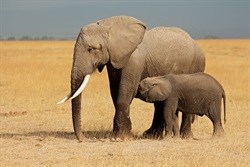
Top stories






More news


Marketing & Media
Ads are coming to AI. Does that really have to be such a bad thing?














"When Hong Kong - a main transit point for illegal ivory into mainland China - destroys its stockpiles, it means that the government will not tolerate ivory smuggling and illegal ivory trade. Destroying stockpiles also sends a strong message to consumers that because ivory comes from dead elephants and the cruel practice of poaching those elephants, the very existence of the ivory trade is wrong," says Grace Ge Gabriel, Asia's regional director of the International Fund for Animal Welfare (IFAW).
The event follows just days after Cambodia officials have confiscated a record three tonnes of illicit ivory concealed in a container of beans at the port of Sihanoukville. Authorities declined to say where the ivory had been shipped from, or its intended final destination.
"The confiscation of such an enormous amount of ivory by Cambodia starkly emphasises the extent of the problem, and why today's ivory burn is so significant," says Ge Gabriel.
Recently, while on a state visit to Kenya, Chinese premier Li Keqiang, offered China's support for efforts to combat rampant poaching of elephants and rhino, including reaching an agreement to fund the provision of equipment for anti-poaching teams.
Most illegal ivory is destined for Asia, in particular China, where it has soared in value as an investment vehicle. Limited availability of legal ivory in China purchased form the stockpile sale in southern Africa in 2008 has, in turn, boosted demand encouraging illegal ivory trade and the poaching of elephant to meet market needs.
In destroying its ivory stockpiles, Hong Kong, a special administrative region of China, joins Kenya, Gabon, the Philippines, US, France and Belgium which have already crushed or burned ivory stockpiles. In January mainland China also crushed 6.1 tons of illegal ivory.
Up to 50,000 elephants a year are killed by poachers for their ivory. The illegal wildlife trade generates an estimated $19bn a year, ranking fourth on the list of the most lucrative illegal activities in the world behind drugs, counterfeiting and human trafficking.
"More than 41 tons of contraband ivory was seized in 2013 - the largest amount in 25 years - with large scale seizures (those weighing more than 800kg) the norm rather than the exception," Ge Gabriel says. Public demand to stop the slaughter of elephants and rampant ivory smuggling had pressured world leaders into taking action to save elephants.